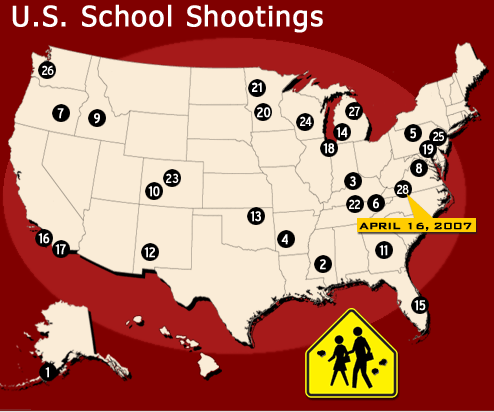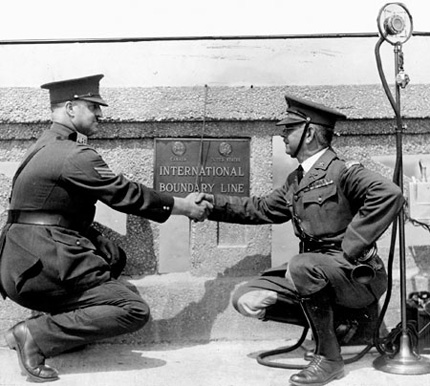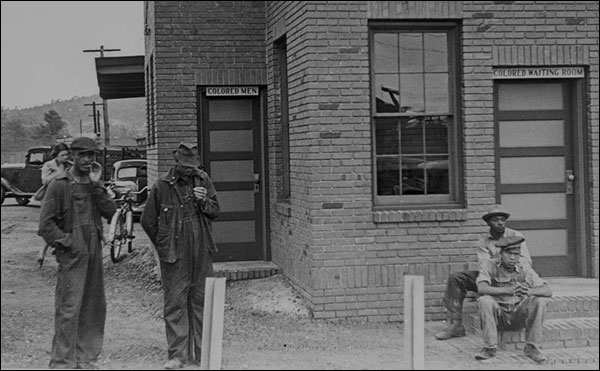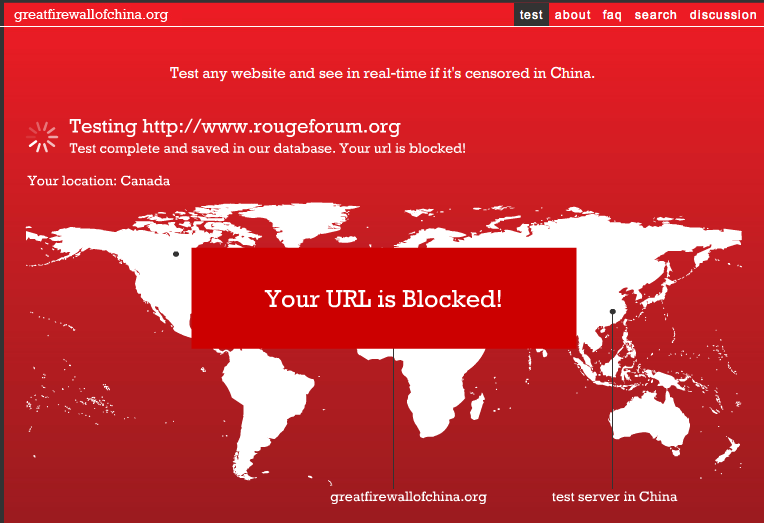
To quotes from Karl on his special day:
The rich will do anything for the poor but get off their backs.
Critical Theories in Education

“Room 101” is hosted by Michael Baker on KZUM 89.3FM in Lincoln, Nebraska and features interviews and talk about issues of education and schooling.
I’m now podcasting “Room 101” from my web site. Check it out! You can listen to the shows (and subscribe to the podcasts) at my site. The podcasts are also available for free from the iTunes store.
Two podcasts are now available and I will be adding more in the days and weeks to come.
Rich Gibson, San Diego State University professor and co-founder of the Rouge Forum, talks with Michael about the schools-to-war pipeline and how the US imperialist project is reflected in the No Child Left Behind Act.
Peter McLaren, UCLA’s “most dangerous professor”, discusses the right-wing agenda for schools; his recent exchanges with Bill Ayers; and the growing efforts to dismantle the No Child Left Behind Act.
Upcoming podcasts will have interviews with Noam Chomsky, Nancy Patterson, Prentice Chandler, activist students from Lincoln, Nebraska and more…
“When fascism comes to America it will be wrapped in a flag and carrying a cross.”—Sinclair Lewis
Okay, now advocating tolerance in US schools is controversial.
An Indiana teacher has been suspended from her job because in her role as student newspaper adviser she did not censor a student opinion column that advocated tolerance for people “different than you.”
In the Woodland Junior-Senior High School newspaper, The Tomahawk, tenth grader Megan Chase wrote:
“I think it is so wrong to look down on those people, or to make fun of them, just because they have a different sexuality than you. There is nothing wrong with them or their brain; they’re just different than you.”
Now the school district has recommend that teacher Amy Sorrell be fired because she did not alert school principal, prior to publication, regarding the “sensitivity” of the material.
Read on for the AP wire story:
Teacher’s Job on Line for Student Column
By TOM COYNE
Associated Press Writer
WOODBURN, Ind. — The column in the student newspaper seemed innocent enough: advocating tolerance for people “different than you.”
But since sophomore Megan Chase’s words appeared Jan. 19 in The Tomahawk, the newspaper at Woodland Junior-Senior High School, her newspaper adviser has been suspended and is fighting for her job, and charges of censorship and First Amendment violations are clouding this conservative northeastern Indiana community.
At issue is whether Chase’s opinion column advocating tolerance of homosexuals was suitable for a student newspaper distributed to students in grades 7 through 12 and whether newspaper adviser Amy Sorrell followed protocol in allowing the column to be printed.
Media advocates say the debate has deeper ramifications.
“This is a real threat to quality student journalism if an adviser can be removed for not having censored a perfectly legitimate story that there was no legal reason why it shouldn’t have been published,” said Mark Goodman, executive director of the Student Press Law Center in Arlington, Va.
School officials in this community of 1,600 residents, 10 miles east of Fort Wayne, say the issue isn’t First Amendment rights but a teacher’s failure to live up to her responsibilities. They contend Sorrell should have alerted Principal Ed Yoder to the article because of the sensitivity of the material.
“The way we view it is the broad topic of homosexuality is a sensitive enough issue in our society that the principal deserves to know that it’s something the newspaper is going to write about,” said Andy Melin, assistant superintendent of secondary education and technology.
Melin said Yoder would have allowed the article to be printed but likely would have suggested some changes.
Sorrell has been placed on administrative leave and the school district has recommended she be fired. A public hearing is scheduled April 28, and the school board expects to vote May 1.
Lucy Dalglish, executive director of the Reporters Committee for Freedom of the Press, argued that students have access to much more mature material in the school library and on the Internet.
“Advocating tolerance is controversial?” she said.
Chase’s column, which she wrote after a friend told her he was gay, said society teaches that “it is only acceptable for a boy and a girl to be together,” which makes declaring one’s sexual orientation difficult.
“I can only imagine how hard it would be to come out as homosexual in today’s society,” she wrote. “I think it is so wrong to look down on those people, or to make fun of them, just because they have a different sexuality than you. There is nothing wrong with them or their brain; they’re just different than you.”
She said she was surprised by school officials’ reaction.
“I didn’t think it was any big deal,” Chase said of the column.
Sorrell, 30, said she showed the principal four stories about teen pregnancy, including an opinion piece advocating teaching safe sex practices over abstinence education, for the same Jan. 19 issue because she thought that “was going to cause the stir.”
But she acknowledges she never mentioned Chase’s column. “There isn’t anything controversial about tolerance,” she said.
Stan Pflueger, president of the Fort Wayne chapter of Parents, Families and Friends of Lesbian and Gays and a graduate of the school district, said he was disappointed with the school system’s reaction.
“The spirit of the article is just asking people to consider what your previous beliefs were about this particular subject,” he said. “There’s a difference between tolerance and agreement.”
But resident Jim Bridge took a tougher stand.
“We all have rules that we have to abide by and it appears that she hasn’t chosen to abide by the rules,” Bridge said. “I own my own business and anybody that did that to me would be fired on the spot. She knew it had to be controversial.”
Sorrell, the daughter of a newspaper editor, said she thought she knew what was acceptable in the school district where she has taught English for four years.
“I’d still make that same judgment,” she said.
___
April 22, 2007 – 11:10 a.m. Copyright 2007, The Associated Press. The information contained in the AP Online news report may not be published, broadcast or redistributed without the prior written authority of The Associated Press.
http://www.statesman.com/news/content/shared-gen/ap/National/School_Newspaper_Flap.html

CBSNews.com provides an interactive map and detailed timeline and description of U.S. school shootings since 1997.
In his ZNet commentary of April 13, Norman Solomon gives us yet another example of how the leading Democratic candidates for the US presidency are warmongers, just like Bush.
ZNet Commentary
Awful Truth About Hillary, Barack, John… and Whitewash
April 13, 2007
By Norman Solomon
The Pentagon’s most likely next target is Iran.
Hillary Clinton says “no option can be taken off the table.”
Barack Obama says that the Iranian government is “a threat to all of us” and “we should take no option, including military action, off the table.”
John Edwards says, “Under no circumstances can Iran be allowed to have nuclear weapons.” And: “We need to keep all options on the table.”
A year ago, writing in The New Yorker, journalist Seymour Hersh reported: “One of the military’s initial option plans, as presented to the White House by the Pentagon this winter, calls for the use of a bunker-buster tactical nuclear weapon, such as the B61-11, against underground nuclear sites.”
For a presidential candidate to proclaim that all “options” should be on the table while dealing with Iran is a horrific statement. It signals willingness to threaten — and possibly follow through with — first use of nuclear weapons. This raises no eyebrows among Washington’s policymakers and media elites because it is in keeping with longstanding U.S. foreign-policy doctrine.
This year, with their virtually identical statements about “options” and “the table,” the leading Democratic presidential candidates — Clinton, Obama and Edwards — have refused to rule out any kind of attack on Iran.
If you’re not shocked or outraged yet, consider this:
On Feb. 22, the national leaders of MoveOn sent an e-mail letter to more than 3 million people with the subject line “War with Iran?” After citing a need to give UN sanctions “a chance to work before provoking a regional conflict,” the letter said flatly: “Senator Hillary Clinton has provided some much needed leadership on this.”
The MoveOn letter quoted a passage from a speech that Clinton had given on the Senate floor eight days earlier: “It would be a mistake of historical proportion if the administration thought that the 2002 resolution authorizing force against Iraq was a blank check for the use of force against Iran without further congressional authorization. Nor should the president think that the 2001 resolution authorizing force after the terrorist attacks of 9/11, in any way, authorizes force against Iran. If the administration believes that any, any use of force against Iran is necessary, the president must come to Congress to seek that authority.”
But, while quoting Hillary Clinton’s speech as an example of “some much needed leadership,” MoveOn made no mention of the fact that the same speech stated: “As I have long said and will continue to say, U.S. policy must be clear and unequivocal: We cannot, we should not, we must not permit Iran to build or acquire nuclear weapons. And in dealing with this threat, as I’ve also said for a long time, no option can be taken off the table.”
Earlier this year, David Rieff noted in The New York Times Magazine on March 25, “Vice President Cheney insisted that the administration had not ‘taken any options off the table’ as Iran continued to defy United Nations calls for it to abandon its nuclear ambitions. The response from Democrats was not long in coming. Senator Clinton helped lead the charge, reminding the president that he did not have the authority to go to war with Iran on the basis of the Senate’s authorization of the use of force in Iraq in 2002.
“But what Senator Clinton did not say was at least as interesting as what she did say. And what she did not say was that she opposed the use of force in Iran. To the contrary, Senator Clinton used virtually the same formulation as Vice President Cheney. When dealing with Iran, she insisted, ‘no option can be taken off the table.'”
To praise Hillary Clinton for providing “much needed leadership” on Iran — and to mislead millions of e-mail recipients counted as MoveOn members in the process — is a notable choice to make. It speaks volumes. It winks at Clinton’s stance that “no option can be taken off the table.” It serves an enabling function. It is very dangerous.
The stakes are much too high to make excuses or look the other way.
______________________________________
Norman Solomon’s book “War Made Easy: How Presidents and Pundits Keep Spinning Us to Death” is out in paperback. For information, go to: www.normansolomon.com

In an essay that appears in the March CCPA Monitor and in CounterPunch, “Pariah” describes how most Americans and Canadians are unaware of the new police state procedures of U.S. officials who seek to keep millions of American “peaceniks” and “radicals” from visiting Canada.

Today’s Globe and Mail reports that in a move that echoes the “colored only” rest rooms of the Jim Crow era, the US military requires Afghan employees at the NATO Kandahar air base to use segregated toilet facilities labeled: “local nationals only.”
![]()
Lieutenant-Colonel Jack Blevins, the U.S. officer in charge of administrative contracts, said the segregated toilet policy exists because the bathroom habits of the Afghans are different from those of the North Americans and Europeans who work at the base.
“We’ve always had this policy,” Lt.-Col. Blevins said. “It’s not based on a racial thing; it’s just how they use the toilets. They’re not used to toilets. They use squats, or holes in the ground.”
Lt.-Col. Blevins said he thinks of the policy as a cultural accommodation, and it makes life easier for the cleaners.
Afghan workers on the base told the Globe and Mail that policy is “insulting” and unfair. Afghan employees also noted that there were not enough to toilets to accomodate them and that unlike the ones reserved for non-Afghans, they were not kept clean.NATO’s potty rules shut out Afghans
JOE FRIESEN
KANDAHAR, AFGHANISTAN — Under a bizarre policy that echoes the days of segregation in the United States, Afghans who work at the NATO base at Kandahar Airfield must use separate toilets marked “local nationals only.”
Several Afghans told The Globe and Mail the practice is insulting, but they are dependent on NATO for their livelihoods and reluctant to speak out.
Lieutenant-Colonel Jack Blevins, the U.S. officer in charge of administrative contracts, said the segregated toilet policy exists because the bathroom habits of the Afghans are different from those of the North Americans and Europeans who work at the base.
“We’ve always had this policy,” Lt.-Col. Blevins said. “It’s not based on a racial thing; it’s just how they use the toilets. They’re not used to toilets. They use squats, or holes in the ground.”
One Afghan, who has worked at the base for five years as an interpreter, laughed at this suggestion.
He can’t give his name because he works with the coalition and is afraid of being targeted by insurgents.
“I don’t see any reason for separate bathrooms,” he said. “Everybody is human, so it should be one [toilet].”
He said that foreign soldiers told him they wouldn’t use the same toilets as Afghans because they are afraid of catching something contagious.
“Soldiers say they’re scared of local people who might have disease,” he said. “Personally, I [do] not like that, but this is the way of the army so you have to respect that.”
The issue came to light when a Globe reporter tried to use the toilets near the main gate at Kandahar Airfield. The guard on duty directed the reporter to toilets 30 metres away, saying the ones directly in front of him were for the Afghans.
Lt.-Col. Blevins said he thinks of the policy as a cultural accommodation, and it makes life easier for the cleaners.
“When they [the Afghans] use our port-a-potties, they stand on the seats and it causes quite a mess,” he said. “I think it’s just a cultural thing.”
The toilets reserved for Afghans typically have the words “local nationals” written on the door, and are a different colour than the ones reserved for non-Afghans. The toilets look the same on the inside, except the plastic seat is sometimes removed from the local national toilets. Afghans say there aren’t enough toilets to accommodate them, and theirs aren’t as well cleaned as the ones reserved for foreigners.
“It’s not fair,” said Qaseem, an Afghan interpreter who works at the base.
He said some foreigners will use the local bathrooms when the lines are long and it suits them, but local Afghans can’t use the bathrooms reserved for the foreigners.
“Some of the army guys, they use the local bathroom, so we should be able to use their bathrooms, too.”
As he speaks, his uncle comes over to say that the separate bathrooms are very nice, and that he’s grateful to NATO for coming to Afghanistan and he hopes they will stay a long time.
Other Afghans who stand in line waiting to be searched as they leave the NATO base said they can accept having to use separate bathrooms and don’t see it as a significant hardship.
A few Afghan employees have the privilege of being able to use either set of toilets because they have worked with the coalition long enough to be considered trusted agents.
Qaseem said the problem comes down to the way Afghans use water to clean themselves before praying. The foreigners don’t like it, he said.
Lt.-Col. Blevins said there can be problems if water bottles, used by the Afghans in their ablutions, have to be fished out of the toilets. Although Afghans are strongly encouraged to use the toilets marked “local nationals only,” they wouldn’t be prevented from using another bathroom in an emergency, he said.
There are also security issues to be considered, he said. Some foreign-only bathrooms are close to the soldiers’ sleeping quarters, which need to be protected.
More than 1,200 local people come through the gates of Kandahar Airfield most days, according to the Canadian guards who operate the main entrance.
They work in a variety of jobs, from manual labour to translation. They are the Afghans who, in a conflict increasingly characterized as a battle for hearts and minds, have the most direct contact with coalition forces.
Relations between the workers and military personnel range from collegial friendships to wariness and suspicion. Translators, partly because they speak English, can become quite close to some officers, while labourers required to have a permanent military escort are not treated with the same consideration.
They are hired under an Afghans-first policy, which seeks to employee as many local people as possible to ensure they see the economic benefits of the foreign presence.

RougeForum.org is blocked in China, but Where the Blog Has No Name isn’t. Hmmm…
Check out greatfirewallofchina.org to test any web site and see in real time if it is block in China.
DontVote.org’s mission is to combat the “Get out the Vote” movement that is pushed by organizations that would like to increase the number of uneducated voters to help their cause.
DontVote.org encourages people to Vote, but only AFTER they have educated themselves on the policies and individuals for which they are voting. Voting should be considered a privilege and exercised with responsibility and discretion. Just like a final exam, responsible voting requires self-education and thought. When the time comes to cast your ballot, if you don’t know for what or whom you’re voting, then DON’T VOTE.
In this month’s Z Magazine, Bill Berkowitz profiles The Pacific Legal Foundation (PLF), a Sacramento, California based anti-affirmative action legal organization, which is aiding the Seattle parents hoping to scuttle that city’s school integration plan. PLF is also part of the team fighting Louisville, Kentucky’s Jefferson County Public Schools.
On December 4th, the U.S. Supreme Court heard arguments in Seattle and Louisville desegregation cases. Parents have sued school districts that use race as a factor in determining where students attend school. The final rulings by the justices could well redefine the meaning of Brown v. Board of Education as it applies to school systems in the 21st century and, more immediately, could affect the status of hundreds of integration plans adopted by districts across the country.
In both cases, parents challenging the integration plans say that Brown forbids officials from basing school enrollment on race—despite the fact that courts have ordered many districts to adopt such plans for years. On the other side, school officials maintain that the vestiges of segregation, especially in housing patterns, require districts to adopt measures that promote greater diversity. Officials note that such plans are not only necessary in terms of equity, but are educationally sound.